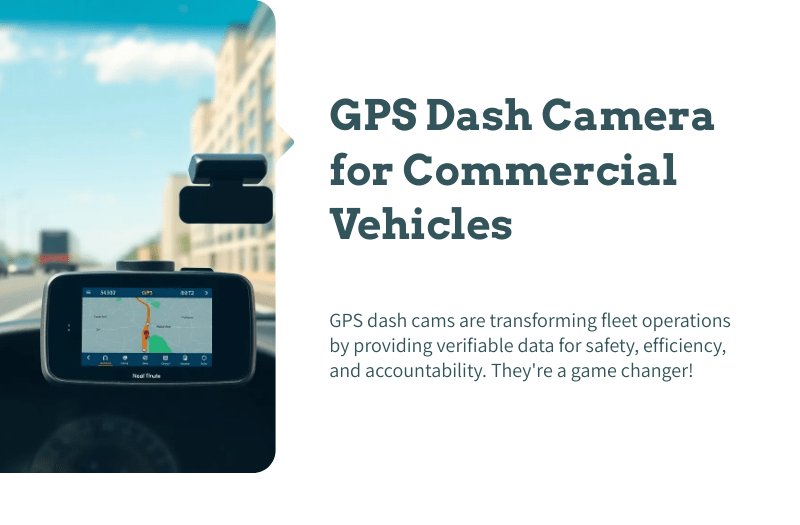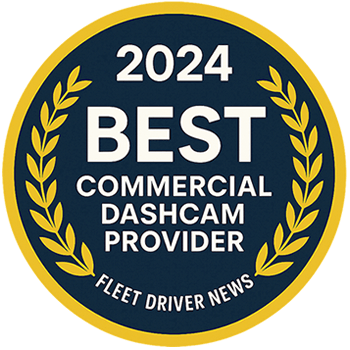
GPS Dash Camera for Commercial Vehicles
Why GPS Dash Cams Are Transforming Fleet Operations
For years, dash cameras were considered a safety accessory — helpful in case of an accident, but not much more. Today, the evolution of GPS-enabled dash cameras has turned them into strategic business tools for commercial fleets.
A GPS dash camera for commercial vehicles not only records incidents but also verifies location, speed, and time. The result? Fleets gain indisputable evidence for liability protection, while also unlocking operational efficiencies such as route optimization, fuel savings, and delivery verification.
In an industry where margins are tight and liability risks are high, this blend of video + GPS data provides the control and accountability executives need to balance safety and profitability.
What Is a GPS Dash Camera for Commercial Vehicles?
At its core, a GPS dash camera combines two technologies:
- Dash Camera Functionality: Records road-facing (and sometimes cabin-facing) video to document events.
- GPS Tracking: Embeds real-time location, speed, and timestamp data into video files.
Commercial-grade versions go further by offering cloud connectivity, AI-driven event detection, and integration with fleet management systems. Unlike consumer dash cams, these devices are built for durability, scalability, and regulatory compliance.

How GPS Elevates the Value of Dash Cams
Contextualized Video Evidence
Without GPS, dash cam footage can be challenged in court. With GPS metadata, fleets can prove not just what happened, but where and how it happened. This makes liability disputes faster and more favorable for carriers.
Route & Performance Verification
GPS adds a management layer. Fleet managers can confirm if drivers followed optimized routes, where delays occurred, and whether unauthorized detours took place.
Delivery Proof & Customer Satisfaction
In industries like delivery, construction, and utilities, disputes about arrival times are common. A GPS dash cam creates verifiable proof of service, strengthening customer trust and eliminating costly disputes.
Theft Deterrence & Recovery
Real-time tracking allows stolen vehicles to be located quickly. Combined with recorded video, this feature has prevented losses worth hundreds of thousands of dollars for commercial fleets.
Key Features to Look for in GPS Dash Cameras
When evaluating solutions, decision-makers should prioritize commercial-grade features that extend beyond simple video recording:
- High-Definition (1080p–4K) Video – Ensures license plates, traffic signals, and road details are clearly visible.
- Dual or Multi-Camera Coverage – Road-facing, driver-facing, and side/rear views for complete visibility.
- GPS with Route Replay – Allows managers to retrace vehicle paths alongside video footage.
- Cloud Connectivity – Instant uploads of critical clips; eliminates the hassle of SD card retrieval.
- AI-Powered Alerts – Detects distracted driving, fatigue, harsh braking, or speeding.
- Integration with Telematics – Syncs GPS and video with broader fleet management platforms.
- Durability & Uptime – Built to withstand vibration, long hours, and extreme weather conditions.

Operational Benefits That Go Beyond Safety
The primary advantage of a GPS dash cam is accident protection, but forward-thinking fleets are using them to achieve much more.
Fuel Efficiency
GPS-based monitoring highlights idling, detours, and inefficient driving behaviors. By addressing these patterns, fleets often cut fuel costs by 5–10% annually.
Improved Routing
Route replay features reveal where drivers lost time, allowing managers to design more efficient delivery patterns and reduce delays.
Driver Accountability & Incentives
Footage combined with location data helps managers coach unsafe habits while also rewarding safe and efficient drivers. Recognition programs based on measurable metrics improve retention.
Regulatory Compliance
Many systems support FMCSA Hours of Service (HOS) reporting and can simplify compliance by combining video verification with GPS logs.
Faster Claims Resolution
Accidents and disputes are resolved more quickly because evidence is both visual and data-driven. This reduces downtime and legal expenses.
Pricing and ROI of GPS Dash Cameras
Cost Tiers
- Entry-Level Systems ($250–$400 per unit):
Road-facing cameras with basic GPS overlays. Suitable for independent operators or very small fleets. - Mid-Tier Options ($500–$800 per unit):
Dual-facing, cloud-enabled, with driver behavior alerts. Best balance for small-to-mid-sized fleets seeking strong ROI. - Premium Fleet Solutions ($1,000+ per unit, plus subscriptions):
Multi-camera coverage, full GPS tracking, AI-driven event analysis, and fleet management integration. Designed for large fleets with higher liability exposure.
ROI Timeline
Most fleets recover the cost of GPS dash cams within 6–12 months through:
- Reduced accident claims.
- Lower fuel and maintenance costs.
- Insurance premium discounts (often 5–15%).
- Faster dispute resolution with customers and insurers.
For high-risk industries, breakeven can happen after a single avoided claim.
Best Use Cases by Industry
- Trucking & Logistics: Monitor long-haul routes, prevent false claims, and optimize schedules.
- Last-Mile Delivery: Provide proof of service and resolve disputes over delivery times.
- Construction Fleets: Protect heavy equipment in transit and track time on job sites.
- Public Transport & Shuttles: Ensure passenger safety and build trust with transparent oversight.
- Utilities & Municipal Fleets: Improve accountability for service calls and taxpayer-funded operations.
Each of these industries benefits from the dual role of GPS dash cams: legal protection + efficiency tool.

What Does a GPS Dash Camera Do?
A GPS dash camera for commercial vehicles records high-definition video while simultaneously tracking a vehicle’s exact location, speed, and route history. Unlike traditional dash cams, GPS models embed metadata into every clip, so fleet managers have time-stamped proof of events and can monitor driver behavior, deliveries, and vehicle usage in real time.
This dual functionality makes GPS dash cams particularly valuable for businesses where both safety and accountability matter. They don’t just show what happened — they show where and when it happened.
GPS Dash Camera vs. Regular Dash Camera: What’s the Difference?
| Feature | Regular Dash Camera | GPS Dash Camera |
| Video Recording | ✔ | ✔ |
| Location Tracking | ✘ | ✔ |
| Speed Verification | ✘ | ✔ |
| Route History | ✘ | ✔ |
| Proof of Delivery | Limited | Strong |
| Fleet Integration | Rare | Common |
A regular dash cam records only video, while a GPS dash cam adds speed, route, and location data, making it far more effective for commercial fleets.
How to Install a GPS Dash Camera in a Commercial Vehicle (Step-by-Step)
Many fleet managers search for installation guidance. A snippet-friendly checklist can capture this intent:
Step 1: Choose the Mounting Location
Select a spot on the windshield where the camera has an unobstructed road view without blocking the driver’s line of sight.
Step 2: Connect the Power Source
Most commercial dash cams use hardwiring kits connected to the fuse box for continuous power, though some plug into the OBD-II port or cigarette lighter.
Step 3: Secure GPS Antenna (if external)
Some models include a separate GPS antenna. Mount it on the dashboard or windshield for optimal satellite connectivity.
Step 4: Sync to Cloud or Fleet Platform
Follow manufacturer instructions to link the device to your cloud account or fleet management software.
Step 5: Test Recording & GPS Tracking
Run a short trip to confirm video quality, GPS accuracy, and event detection alerts.

Checklist: What to Consider Before Buying a GPS Dash Cam
- Video Quality: Look for 1080p or higher with night vision.
- GPS Accuracy: Check satellite lock speed and precision.
- Storage Options: Does it support cloud, local SD, or both?
- AI Alerts: Can it detect harsh braking, fatigue, or distraction?
- Integration: Will it work with your existing fleet management tools?
- Durability: Is it vibration-resistant and weatherproof?
- Scalability: Can it be deployed easily across a large fleet?
- Support & Warranty: Are replacement programs or updates included?
The best GPS dash cameras balance video clarity, accurate tracking, cloud storage, and fleet integration.
How GPS Dash Cameras Improve Compliance and Audits
Regulatory compliance is a frequent query for fleet managers. GPS dash cams simplify several aspects:
- Hours of Service (HOS): Footage + GPS data validates log accuracy.
- Accident Investigations: Evidence is immediately accessible for auditors or insurance adjusters.
- CSA Scores: Safer driving behavior, documented through video and GPS, improves fleet safety ratings.
- Local Regulations: Some municipalities require proof of service (e.g., garbage collection). GPS-enabled video creates indisputable records.
This makes GPS dash cams not just a defensive tool, but a compliance ally.
Scenario-Based Use Cases
1. Delivery Fleet Disputes
A customer claims their package was not delivered on time. With a GPS dash cam, the fleet manager pulls a clip showing the vehicle at the delivery address at 2:14 PM. Dispute resolved in minutes.
2. Accident Liability
A commercial van is accused of speeding before a collision. The dash cam shows the posted speed limit sign and proves the driver was within the limit — verified by GPS-tagged speed data.
3. Route Optimization
A utility fleet discovers drivers taking non-approved detours. GPS route history reveals inefficiencies, helping managers redesign faster routes.

Benefits of GPS Dash Cameras for Different Business Sizes
- Independent Contractors: Affordable units provide accident defense and delivery proof without expensive fleet systems.
- Small-to-Mid Fleets: Balance cost and capability with dual-facing cameras and cloud access.
- Enterprise Fleets: AI-enabled, multi-camera systems integrate with telematics to monitor hundreds of vehicles seamlessly.
GPS dash cams scale to fit any business — from single operators needing protection to enterprise fleets optimizing operations.
Why Cloud Storage Matters for GPS Dash Cams
Without cloud storage, video footage lives only on an SD card. For fleets, this creates risks:
- Physical cards can be lost, stolen, or damaged.
- Access is delayed when footage must be retrieved manually.
- Storage space is limited, causing older files to overwrite automatically.
Cloud storage ensures instant access to GPS-tagged footage, making it essential for commercial operations.
FAQ: GPS Dash Cameras for Commercial Vehicles
What is the biggest difference between a GPS dash cam and a telematics device?
A telematics unit tracks vehicle data but doesn’t capture visual context. A GPS dash cam merges the two, providing both numbers and video for full incident clarity.
Can GPS dash cams prevent theft?
Yes. Real-time tracking helps locate stolen vehicles quickly. In combination with live video, fleets can provide law enforcement with actionable intelligence.
Do GPS dash cameras work internationally?
Most commercial-grade systems use cellular or satellite connectivity and can operate across borders, though cloud subscription coverage may vary by region.
Will drivers push back against GPS dash cams?
Some may initially resist, but fleets that frame the technology as a protection tool (to defend against false claims) see stronger acceptance. Incentive programs for safe driving further reduce resistance.
Can footage be shared instantly with insurers?
Yes. Cloud-enabled GPS dash cams allow fleet managers to send verified footage within minutes, accelerating claim cycles.
How does GPS help with customer disputes?
GPS time-stamped video provides indisputable proof of when and where a vehicle arrived, resolving disputes over deliveries or service calls.
What’s the typical lifespan of a GPS dash camera system?
Commercial systems generally last 3–5 years, with warranties and replacement programs available from most providers.
Do these cameras require a monthly fee?
Most commercial systems charge a subscription for cloud storage and GPS tracking. While this adds cost, it ensures scalability and instant access to footage.
Can GPS dash cams integrate with existing fleet management software?
Yes. Leading providers offer open APIs and direct integrations, allowing video + GPS data to sync with existing telematics platforms.
Are GPS dash cams compliant with FMCSA rules?
es. They are legal under FMCSA guidelines as long as they don’t obstruct the driver’s view. Some providers even add compliance tools to streamline recordkeeping.

